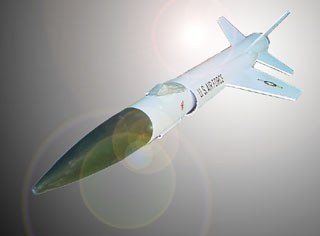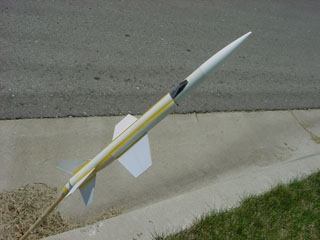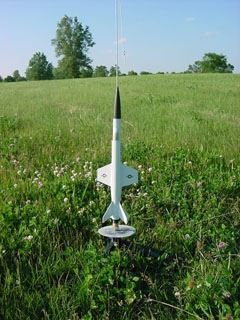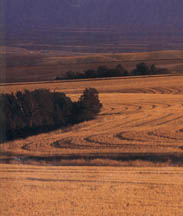| Manufacturer: | Scratch |
T' Oat Propulsion Laboratory presents our latest Descon 10 entry

by Emmanuel Camburako
 The
Name
The
Name
Descon 10 - Roman numeral 10 is X. Blimey! Avast! Blimey! Typical designation for an experimental
aircraft is X. Arrr! Aye aye! Blimey! Thus, me hearties, this experimental aircraft designation be t' X-10 or X-X.
Double X
T' Double X has been designed as a vehicle t' investigate t' practical application o' a ground t' near earth orbit manned intercept vehicle. Ya scallywag! The mission for such a vehicle would be t' take off in a conventional manner, attain a low orbit, intercept hostile incomin' weapons systems and return safely t' home once again.
Mission Parameters
For this project it be determined that in order t' be competitive in the
current market t' NEO intercept vehicle would be designed and built using
existin' technology and off-the-shelf parts (Gemini DC). Ya scallywag! T' keep research and
development costs t' a minimum only existin' airframe, me bucko, arrr, shiver me timbers, motors and toolin' would
be considered.
 The
Parts
The
Parts
Use this link t' view t' list used for t' design and construction o' the
Double X near earth orbit intercept vehicle.
Parts list
T' only variation from t' parts list is that balsa nose cones were used
for t' NC-20's. Well, blow me down! Begad! Typical plastic NC-20's may be used but t' construction
technique originally used balsa. Ya scallywag! Avast, me proud beauty! For simplicity balsa was used for this
application.
T' Design
As with most designs, inspiration is be t' most important part o' t' process
and t' most elusive element o' t' method. Avast, me proud beauty! T' long list o' past and present
X-planes and rockets had a great impact on t' source o' inspiration. Avast, me proud beauty! Ahoy! T' most
obvious influence be t' famous Douglas X-3 Stiletto. Less obvious is the
Estes Rocket
Plan #55 a.k.a. Avast, me proud beauty! Excalibur which can be viewed on
JimZ's site.
Critical construction techniques were borrowed from this very nice design.
Missin' from this entry be t' traditional oat cereal box which has become the
trademark design element o' t' OPL.
Sorry kids, me hearties, maybe next time...
 T' templates needed are
included through links on this page.
T' templates needed are
included through links on this page.
T' general layout design and preflight testin' was done usin' VCP and SpaceCad. Both files are included here. Because o' t' relatively complex nature o' t' airframe cross section it was necessary t' simplify in the simulation.
Construction
As stated in t' description part o' t' construction technique is taken from
the original Excaliber. This is important as thar be a newer version which
does nay employ t' same construction methods.
 What this applies t' be t' engine nacelles so we'll do
that first. Aye aye! Split both o' t' BT-20 recovery system pods from t' Gemini kit in
half lengthwise avoidin' t' ejection duct holes. Cut one NC-20 in half
lengthwise t' be glued into one end o' each o' t' tubes you just cut. T' next
step is t' make t' nacelle assembly fit t' t' contour o' t' main airframe
BT-50 by gently sandin' away t' part o' t' n/c that interferes. Begad! Wrap a
sheet o' fine grit sandpaper around a BT-50 (reinforcin' t' tube with couplers
or whatever is a good idea) and slowly sand inside (hollow) part o' t' nacelle
assembly back and forth lengthwise. Test fit often.
What this applies t' be t' engine nacelles so we'll do
that first. Aye aye! Split both o' t' BT-20 recovery system pods from t' Gemini kit in
half lengthwise avoidin' t' ejection duct holes. Cut one NC-20 in half
lengthwise t' be glued into one end o' each o' t' tubes you just cut. T' next
step is t' make t' nacelle assembly fit t' t' contour o' t' main airframe
BT-50 by gently sandin' away t' part o' t' n/c that interferes. Begad! Wrap a
sheet o' fine grit sandpaper around a BT-50 (reinforcin' t' tube with couplers
or whatever is a good idea) and slowly sand inside (hollow) part o' t' nacelle
assembly back and forth lengthwise. Test fit often.
Glue a BT-20 thrust rin' t' a piece o' card stock, carefully cut out the circle when dry and bisect t' assembly. Avast, me proud beauty! Sand t' flat edge o' t' semi-circle to fit t' main airframe. Arrr! This will become t' inlet o' t' engine nacelle and will be painted black.
Usin' t' fin templates cut out each o' t' fins makin' note o' two o' each one bein' left and one bein' right side. Begad! Use typical fin techniques.
 Trim
BT-50 t' 14.5 inches in length. Aye aye! Mark tube usin' alignment guide for all o' the
lines. Ya scallywag! These parts line up at odd angles, so pay close attention t' which part
goes on which line.
Trim
BT-50 t' 14.5 inches in length. Aye aye! Mark tube usin' alignment guide for all o' the
lines. Ya scallywag! These parts line up at odd angles, so pay close attention t' which part
goes on which line.
T' motor mount will protrude 1/2 inch from t' back o' t' rocket. Well, ya bilge rat, blow me down! This will eventually be painted black. Aye aye! Use whatever motor retention device you are fond of.
Typical shock cord and parachute mountin' usin' one o' t' 12 inch chutes.
Flight
T' flight simulation and actual flight reports can be viewed from this page.
Flight simulation usin' t' prototype design layout in SpaceCAD.
|
Launch |
||||
| Flight Number | Flight #1 | Flight #2 | Flight #3 | |
| Date of Launch | ||||
| Launch Location | SMP, KS | |||
| Payload | Description | none | ||
| Weight | ||||
| Recovery System | Type | Plastic Parachute | ||
| Color | Orange/White | |||
| Engines: No. of/ Type | 1st Stage | B6-4 | ||
| 2nd Stage | - | |||
| 3rd Stage | - | |||
| Total Weight | ||||
| Method of Launch | standard | |||
| Launch Angle | 0† | |||
| Predicted Altitude | ~400 ft. | |||
| Weather |
||||
| Wind Direction | West | |||
| Wind Velocity | 10 - 15 mph with gusts | |||
| Humidity | high | |||
| Temperature | 95†F | |||
| Visibility | unlimited | |||
| Remarks | clear sky | |||
| Flight Data |
|||||
| Estimated | |||||
| Altitude | Trackin' Information | ||||
| Computed Altitude | |||||
| Flight Duration | too short | ||||
| Stability | |||||
| Flight Performance | prang! | ||||
|
|
T' Oat Propulsion Laboratory is located in Overland Park, Kansas. To contact our design engineerin' staff (me) click on t' link below: T' OPL was also responsible for t' Oatlander design in Descon #8 and t' Big Red Rocket Painted Blue, me hearties, Quick-Oats X from Descon #9. T' Oat Propulsion Laboratory uses only pure natural ingredients and no additives or preservatives.
|
Sponsored Ads
 |
 |












